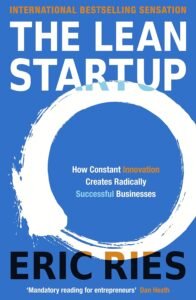“The Lean Startup” by Eric Ries is a must-read for entrepreneurs and innovators, offering a new approach to building successful startups in an age of uncertainty. Ries advocates for a methodology based on continuous innovation, rapid prototyping, and validated learning. The book emphasizes the importance of testing ideas quickly and efficiently to learn what works and what doesn’t, reducing waste and increasing the chances of success. Ries introduces concepts such as the minimum viable product (MVP) and pivoting, which have become central to modern startup culture.

Key Takeaways:
1. Build-Measure-Learn Feedback Loop: Ries introduces the build-measure-learn feedback loop as the core process for developing products and businesses. Startups should build a product quickly, measure customer reactions, and learn from the feedback to make informed decisions.
2. Minimum Viable Product (MVP): The MVP is a version of the product with just enough features to be tested by early adopters. The goal is to learn as much as possible with the least amount of effort and resources, allowing for rapid iteration and improvement.
3. Validated Learning: Ries emphasizes the importance of validated learning, where startups use real customer data to validate their assumptions and business model. This approach reduces the risk of investing in ideas that don’t work.
4. Pivot or Persevere: Based on the feedback from the MVP and the results of validated learning, startups must decide whether to pivot (change direction) or persevere with their current strategy. Pivoting allows startups to adapt to new information and market conditions.
5. Continuous Innovation: The Lean Startup methodology encourages a culture of continuous innovation, where startups constantly experiment, learn, and adapt. This approach helps businesses stay agile and responsive to changing market demands.






Discussion about this post